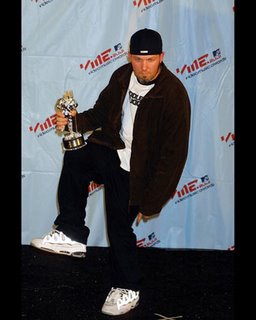Ding dong, the Limp Bizkit is dead...I hope
 I'm glad of the possiblity that the poster-boys of date-rape rock Limp Bizkit are done and over. Their last two albums have been commercial disappointments, and the band's on-again, off-again guitarist Wes Borland has gone on to say: "We're officially on hiatus, maybe even officially over...No one said, 'We're done as a band.' Everyone's just doing their own thing, and [some members] don't have time for this band anymore. I haven't quit, but I've also decided to stop thinking about Limp. I'm not going to keep trying to breathe life into a dying animal. We just basically stopped talking. I feel bad for the fans that [might] think something's actually going to happen with Limp [in the future]. It's not happening."
I'm glad of the possiblity that the poster-boys of date-rape rock Limp Bizkit are done and over. Their last two albums have been commercial disappointments, and the band's on-again, off-again guitarist Wes Borland has gone on to say: "We're officially on hiatus, maybe even officially over...No one said, 'We're done as a band.' Everyone's just doing their own thing, and [some members] don't have time for this band anymore. I haven't quit, but I've also decided to stop thinking about Limp. I'm not going to keep trying to breathe life into a dying animal. We just basically stopped talking. I feel bad for the fans that [might] think something's actually going to happen with Limp [in the future]. It's not happening."I hate Limp Bizkit and their lead "singer" Fred Durst because they helped set back whatever progress was made in rock in the 90s. When altenative rock gained popularity in the early 90s, it exposed the public to more progressive views of women and gays then they had in the previous decade. There were the riot-grrl and homocore movements. Kurt Cobain would say in interviews that women were going to be the future of rock. Green Day would have the queer-core band Pansy Division open up for them on their headlining stadium tour. Eddie Vedder of Pearl Jam spoke out for pro-choice concerns. And even though there were few female alternative stars that crossed over and became iconic figures in the mainstream a la Nirvana or Pearl Jam, there were more females in alternative rock than before--in the mid-90s you could look on Billboard magazine's Modern Rock chart and notice that about half the acts on that chart were either female or bands that had women in their line-ups. That was a fry cry from, say, Axl Rose spewing out anti-gay lyrics on "One In A Million" just a few years before.
But then things started to change in the late 90s. Acts like Limp Bizkit, Korn, Kid Rock and Eminem started to become popular on those modern rock stations-as well as on regular rock and pop stations, with their I-wanna-be-black swagger, their aggressive and sometimes violent hyper-macho persona, complete with 'bitch ho" type lyrics. Limp Bizkit personified that cultural shift when they were invited to perform at Woodstock 1999, where fans started to tear up the stage and there were reports of several rapes and sexual assults in the audience during that performance. Some blamed Durst for inciting the violence, and Durst fought back saying that he wasn't to blame. (What were the promoters of Woodstock '99 doing, hiring a band that had violent lyrics like "Break Stuff," for a concert that was supposed to be about "peace and love?") But with their misogynic lyrics it would be hard to set the band apart from their actions. If you were a woman in a Limp Bizkit song, you were either a groupie ready to suck their
Limp Bizkit weren't above pulling any fag-baiting bullshit either. While LB were in Australia for the Big Day Out rock festival in 2001, Fred would incite the crowd into calling Brian Molko, the fey lead singer of the British rock band Placebo, a "faggot." And when a Chicago audience pelted the band with garbage a couple two years later, Fred responded with a slew of anti-gay epithets.
And as knuckle-dragging rap-rock mu-metal bands like Limp Bizkit gained staggering popularity, the modern-rock stations were starting to shut out more and more women musicans from the airwaves. Female acts such Elastica and Belly that had considerable success on those stations in the mid-90s would have a hard time getting on those same stations a few years later. If women wanted to gain fame through music, they would have to do that through teen-pop a la Britney or R&B a la Beyonce or J-Lo, certainly not through rock. (Real rock, not the faux-"rock" kind of Avril Lavigne either.) Women and gays were being set further apart from rock's mainstream. The growing conservatism of rock at the turn of the millennium would reflect the same condition on American political landscape as it went from Clinton permissiveness to Bush stifleness. Courtney Love, who once was seen as a visionary singer and songwriter who saw the condition of the female spirit, would in a few years be reduced to a harpy druggy shrew that would exploit her late husband's estate every which way the wind blew. And Liz Phair, who once could be counted on as a real "woman of rock" with songs like "Supernova" back in the ninties, would make a desperate comeback bid in 2003 with a bunch of faux-rock songs that put together by Avril's production team the Matrix, and started parading around in skimpy schoolgirl outfits like she was barely eighteen (she was twice that age at the time).
If Kurt Cobain was alive during that time, he would have likely ended up being tagged as the Alan Alda of rock. Manly men would say that he was being beaten in PC feminist passivity, isn't it glad that we were able to go beyond all that? Women want a real man, not some wimp telling them they're equal. Isn't it great that the likes of Limp Bizkit and Eminem were able to show us the way?
Fortuneately, as this decade went on more and more men started to see Durst's hyper-macho persona as ridiculous. When the band released their 2005 album The Unquestional Truth (Part 1), it sounded like the title of a bad 70s prog-rock album, and it had an album cover to match as well. But there wasn't a lot of promotion for that record. As a matter of fact the only big promotion for the album seemed to be a homemade porn film featuring Fred Durst, screwing some anonymous bimbo and telling her to "grab my ass and balls," that got "leaked" onto the internet a couple of months before. Durst then threatened to sue some websites that showed the footage, saying that the video was stolen. Whether it truly was stolen or was just a calculated effort to boost Durst's heterosexual credibility, it didn't help album sales; the album was a commercial disappointment, getting only to #24 on Billboard's album chart and selling only 37,000 copies in its first week. A "greatest hits" compilation, imaginatively titled Greatest Hitz, would come out in November of that same year. Even though it did get some aggressive promo, it would sell even less than Truth, getting only to #47 on the same album chart.
 Even though I'm glad that Fred Durst and his band's cultural influence has wained greatly recently (it was scary during 1999-2003 there were teen-age boys that wanted to be just like him), he'll still be around the industry dealing with his women issues in his usual fashion. He signs bands to his Geffen Records label imprint, Flawless, such as a deriative Bauhaus/Joy Divison outfit She Wants Revenge, who have song lyrics like "Tear You Apart" that wouldn't sound out of place on a Limp Bizkit album, and an album cover featuring a photo of a young woman posing in her underwear, but her head is cropped out of the picture. Durst also has been talking about directing movie features as well. Like he'd be willing to direct the next Brokeback Mountain. He's even threatening to develop a TV talk/"reality" show. Like the world needs a skater version of Jerry Springer. But for now I'm glad that a rock act that has been promoting sexist, hyper-macho and homophobic attitudes has been losing their popularity. Now only if the same thing could happen to Eminem and 50 Cent!
Even though I'm glad that Fred Durst and his band's cultural influence has wained greatly recently (it was scary during 1999-2003 there were teen-age boys that wanted to be just like him), he'll still be around the industry dealing with his women issues in his usual fashion. He signs bands to his Geffen Records label imprint, Flawless, such as a deriative Bauhaus/Joy Divison outfit She Wants Revenge, who have song lyrics like "Tear You Apart" that wouldn't sound out of place on a Limp Bizkit album, and an album cover featuring a photo of a young woman posing in her underwear, but her head is cropped out of the picture. Durst also has been talking about directing movie features as well. Like he'd be willing to direct the next Brokeback Mountain. He's even threatening to develop a TV talk/"reality" show. Like the world needs a skater version of Jerry Springer. But for now I'm glad that a rock act that has been promoting sexist, hyper-macho and homophobic attitudes has been losing their popularity. Now only if the same thing could happen to Eminem and 50 Cent!


1 Comments:
Well, there has never been a soul who ever went broke by underestimating the tastes of the public. Macho was indeed overdue for its comeback. Even in the gay community more assholes began spouting "straight acting/straight appearing" bull crap. Unfortunately, women have responded accordingly according to Pink in her new song, "Stupid Girls." Who knows what the legacy of the Bush years will be?
Post a Comment
<< Home